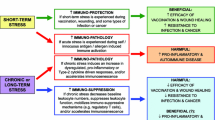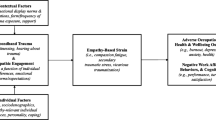Abstract
Purpose
To better understand the beliefs about a causal role of emotional stress maintained by women seeking fertility care.
Methods
A cross-sectional, self-administered survey was distributed to fertility care patients at an academic fertility center in Illinois. Of 5000 consecutive patients, 1460 completed the survey and were included in the study sample.
Results
Members of our sample (N = 1460) were between 20 and 58 years (mean = 36.2, SD = 4.4). Most respondents were White (72.2%), were in a heterosexual relationship (86.8%), and felt that their physician understood their cultural background (79.4%). Of the sample, 28.9% believed emotional stress could cause infertility, 69.0% believed emotional stress could reduce success with fertility treatment, and 31.3% believed that emotional stress could cause a miscarriage, with evidence of significant racial differences. Less than a quarter (23.8%) of the sample believed emotional stress had no impact on fertility. Lower household income and educational attainment were associated with a greater belief in emotional stress as a causative factor in reproduction with regard to infertility, fertility treatment, and miscarriage.
Conclusion
The majority of women seeking fertility care believe emotional stress could reduce the success of fertility treatment. Furthermore, beliefs about emotional stress and reproduction significantly differ based on race/ethnicity, income, and education. Particular attention should be paid to specific groups of women who may more likely not be aware of the lack of a proven biological relationship between emotional stress and reproduction.

Similar content being viewed by others
References
Chandra A, Copen CE, Stephen EH. Infertility and impaired fecundity in the United States, 1982-2010: data from the National Survey of Family Growth. Natl Health Stat Report. 2013;(67):1–18.
Palomba S, Daolio J, Romeo S, Battaglia FA, Marci R, La Sala GB. Lifestyle and fertility: the influence of stress and quality of life on female fertility. Reprod Biol Endocrinol. 2018;16:113.
Becker, G. The Elusive Embryo: How Men and Women Approach New Reproductive Technologies (First ed.). University of California Press. 2000. https://doi.org/10.1525/california/9780520224308.001.0001.
Exley C, Letherby G. Managing a disrupted lifecourse: issues of identity and emotion work. Health. 2001;5:112–32.
Rooney KL, Domar AD. The relationship between stress and infertility. Dialogues Clin Neurosci. 2018;20:41–7.
Lawson AK. Psychological stress and fertility. Fertility and Assisted Reproductive Technology (ART): Theory, Research, Policy and Practice for Health Care Practitioners 2016:65.
Domar A, Gordon K, Garcia-Velasco J, La Marca A, Barriere P, Beligotti F. Understanding the perceptions of and emotional barriers to infertility treatment: a survey in four European countries. Hum Reprod. 2012;27:1073–9.
Pasch LA, Sullivan KT. Stress and coping in couples facing infertility. Curr Opin Psychol. 2017;13:131–5.
Gameiro S, Boivin J, Peronace L, Verhaak CM. Why do patients discontinue fertility treatment? A systematic review of reasons and predictors of discontinuation in fertility treatment. Hum Reprod Update. 2012;18:652–69.
Gameiro S, Boivin J, Domar A. Optimal in vitro fertilization in 2020 should reduce treatment burden and enhance care delivery for patients and staff. Fertil Steril. 2013;100:302–9.
Rich CW, Domar AD. Addressing the emotional barriers to access to reproductive care. Fertil Steril. 2016;105:1124–7.
Boivin J, Griffiths E, Venetis CA. Emotional distress in infertile women and failure of assisted reproductive technologies: meta-analysis of prospective psychosocial studies. BMJ. 2011;342:d223.
Matthiesen SM, Frederiksen Y, Ingerslev HJ, Zachariae R. Stress, distress and outcome of assisted reproductive technology (ART): a meta-analysis. Hum Reprod. 2011;26:2763–76.
Purewal S, Chapman SCE, van den Akker OBA. Depression and state anxiety scores during assisted reproductive treatment are associated with outcome: a meta-analysis. Reprod BioMed Online. 2018;36:646–57.
Nicoloro-SantaBarbara J, Busso C, Moyer A, Lobel M. Just relax and you'll get pregnant? Meta-analysis examining women's emotional distress and the outcome of assisted reproductive technology. Soc Sci Med. 2018;213:54–62.
Verkuijlen J, Verhaak C, Nelen WLDM, Wilkinson J, Farquhar C. Psychological and educational interventions for subfertile men and women. Cochrane Database Syst Rev. 2016;3:CD011034.
Lord S, Robertson N. The role of patient appraisal and coping in predicting distress in IVF. J Reprod Infant Psychol. 2005;23:319–32.
Koert E, Harrison C, Bunting L, Gladwyn-Khan M, Boivin J. Causal explanations for lack of pregnancy applying the common sense model of illness representation to the fertility context. Psychol Health. 2018;33:1284–301.
Missmer SA, Seifer DB, Jain T. Cultural factors contributing to health care disparities among patients with infertility in Midwestern United States. Fertil Steril. 2011;95:1943–9.
Greil AL, McQuillan J, Sanchez D. Does fertility-specific distress vary by race/ethnicity among a probability sample of women in the United States? J Health Psychol. 2014;21:183–92.
Brochu F, Robins S, Miner SA, Grunberg PH, Chan P, Lo K, et al. Searching the Internet for Infertility Information: A Survey of Patient Needs and Preferences. J Med Internet Res. 2019;21:e15132.
Zillien N, Haake G, Fröhlich G, Bense T, Souren D. Internet use of fertility patients: a systemic review of the literature. J Reproduktionsmed Endokrinol. 2011;8:281–7.
Medicine ASfR. Minimum standards for practices offering assisted reproductive technologies: a committee opinion. Fertil Steril. 2020;113:536–41.
Society CFaA. Counseling Special Interest Groups. In. Vol. 2020, 2020.
Embryology ESoHRa. Routine psychosocial care in infertility and medically assisted reproduction – A guide for fertility staff. In: Group EPaCGD, ed. Vol. 2020, 2015.
Pasch LA, Holley SR, Bleil ME, Shehab D, Katz PP, Adler NE. Addressing the needs of fertility treatment patients and their partners: are they informed of and do they receive mental health services? Fertil Steril. 2016;106:209–15.e2.
Dawadi S, Takefman J, Zelkowitz P. Fertility patients demonstrate an unmet need for the provision of psychological information: A cross sectional study. Patient Educ Couns. 2018;101:1852–8.
Souter VL, Penney G, Hopton JL, Templeton AA. Patient satisfaction with the management of infertility. Hum Reprod. 1998;13:1831–6.
van Empel IW, Nelen WL, Tepe ET, van Laarhoven EA, Verhaak CM, Kremer JA. Weaknesses, strengths and needs in fertility care according to patients. Hum Reprod. 2010;25:142–9.
Dancet EA, Nelen WL, Sermeus W, De Leeuw L, Kremer JA, D'Hooghe TM. The patients' perspective on fertility care: a systematic review. Hum Reprod Update. 2010;16:467–87.
Miller-Matero LR, Dubaybo F, Ziadni MS, Feit R, Kvamme R, Eshelman A, et al. Embedding a psychologist into primary care increases access to behavioral health services. J Prim Care Community Health. 2015;6:100–4.
Jain T, Hornstein MD. Disparities in access to infertility services in a state with mandated insurance coverage. Fertil Steril. 2005;84:221–3.
Jain T. Socioeconomic and racial disparities among infertility patients seeking care. Fertil Steril. 2006;85:876–81.
Acknowledgments
The authors thank Jocelyn Dorney, and Deepthi Devireddy for their assistance with survey design.
Author information
Authors and Affiliations
Corresponding author
Ethics declarations
Not applicable
Conflict of interest
The authors declare that they have no conflict of interest.
Additional information
Publisher’s note
Springer Nature remains neutral with regard to jurisdictional claims in published maps and institutional affiliations.
Supplementary information
ESM 1
(DOCX 187 kb).
Rights and permissions
About this article
Cite this article
Negris, O., Lawson, A., Brown, D. et al. Emotional stress and reproduction: what do fertility patients believe?. J Assist Reprod Genet 38, 877–887 (2021). https://doi.org/10.1007/s10815-021-02079-3
Received:
Accepted:
Published:
Issue Date:
DOI: https://doi.org/10.1007/s10815-021-02079-3




